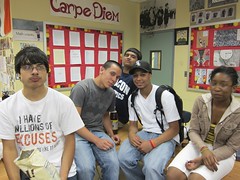1. Butterflies–Complete Chapter 5! Remember, to annotate with intention (to put the annotations to use in discussion or writing) and meaning.
2. Sneak Peak–Confessional Poetry
MOST IMPORTANTLY…HAVE A WONDERFUL THANKSGIVING!!! THANK YOU!
English with Mr. Leon
1. Butterflies–Complete Chapter 5! Remember, to annotate with intention (to put the annotations to use in discussion or writing) and meaning.
2. Sneak Peak–Confessional Poetry
MOST IMPORTANTLY…HAVE A WONDERFUL THANKSGIVING!!! THANK YOU!
1. Butterflies–Read and annotate up to p. 74. On Wednesday, I would like to hear what you’ve annotated and why. Also, there will be a reading quiz Wednesday (Don’t fret! If you read, it will be insultingly easy!)
2. (If you were absent) Gratitude Letters!!! Yes, in the spirit of being thankful, please write (handwritten preferably) a letter to someone for whom you are grateful. Thank them and let them know why you are thankful. Be heartfelt. Write your name at the bottom of the letter (Or somewhere on the letter). This letter should be addressed to an adult in the building. Fold the letter in thirds (or put it in an envelope) and write the recipient’s name on the outside (include position here at Lusher).
3. Note: Everyone should have edited a peer’s work (i.e. detailed outline). Even if absent, it is your responsibility to ensure that you edit someone’s outline or paragraph.
1. WAYG Paragraph–This paragraph will be evaluated using the same questions we used in class. I will also consider grammar and style when grading (pay attention to use of “to be” verbs). You are expected to turn in your outline as well. Format for paragraph:
Your Name
English 1B
11/13/17
2. You are turning in your copy of Where are You Going, Where Have you Been?
3. Butterflies–read and annotate Chapter 3.
1. You are to outline a paragraph for Where are You Going… Follow the format posted on the board (Recreated here):
I. Topic Sentence
A. Write out your first quotation.
1. Analyze the quotation. DO NOT SUMMARIZE.
B. Write out your second quotation.
1. Analyze the quotation. AGAIN, DO NOT SUMMARIZE.
Keep in mind:
1. Your topic sentence should have an observation and an assertion/argument. Often, the more nuanced the observation, the more interesting the argument/discussion. A nuanced observation requires close reading and good control.
2. Choice of evidence in literary writing is a BIG DEAL! Yes! It is the most important choice because your argument is totally dependent on it as it illustrates and illuminates your argument. Accordingly, do not summarize the quote. Rather, analyze it and connect it to your argument. If you can think of nothing to say about your chosen evidence, choose again. Truth be told, you should always gather evidence around a controlling idea before crafting an argument. I will teach you all of the above.
1. You are to outline a paragraph for Where are You Going… Follow the format posted on the board (Recreated here):
I. Topic Sentence
A. Write out your first quotation.
1. Analyze the quotation. DO NOT SUMMARIZE.
B. Write out your second quotation.
1. Analyze the quotation. AGAIN, DO NOT SUMMARIZE.
Keep in mind:
1. Your topic sentence should have an observation and an assertion/argument. Often, the more nuanced the observation, the more interesting the argument/discussion. A nuanced observation requires close reading and good control.
2. Choice of evidence in literary writing is a BIG DEAL! Yes! It is the most important choice because your argument is totally dependent on it as it illustrates and illuminates your argument. Accordingly, do not summarize the quote. Rather, analyze it and connect it to your argument. If you can think of nothing to say about your chosen evidence, choose again. Truth be told, you should always gather evidence around a controlling idea before crafting an argument. I will teach you all of the above.

Advisory, Day One

Near the End

London

Halloween Gathering

End of the Year

Super Sophs

A Sophomore Halloween

Still Working

Last Day 10F

Still in London

End of Year Lunch

Central Park with the Advisory

Hamlet Adaptation

The Wonderful Young People of Beacon

So Long

A Highlight

Advisory Freshmen Year

A Hamlet Group

An Advisee

Advisory

Last Day 10F

Rohan!

Advisory Party

Sophomore Music

Again...
| M | T | W | T | F | S | S |
|---|---|---|---|---|---|---|
| 1 | 2 | 3 | 4 | 5 | 6 | 7 |
| 8 | 9 | 10 | 11 | 12 | 13 | 14 |
| 15 | 16 | 17 | 18 | 19 | 20 | 21 |
| 22 | 23 | 24 | 25 | 26 | 27 | 28 |
| 29 | 30 | |||||
Copyright © 2024 Blackboard Dreams and Sean Leon · All Rights Reserved · Log in